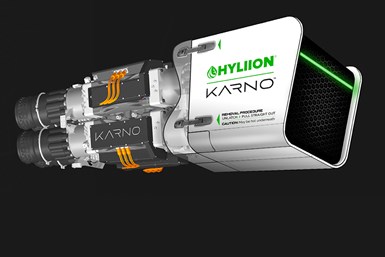GE Sells Generator Technology for Stake in EV Startup
The company says the Karno generator is expected to be 20%+ more efficient than today’s leading generators — achieved by 3D printing of thermal components and innovative fuel-to-electricity conversion.
Share
The Hyliion Karno, a next-generation hydrogen and fuel-agnostic capable generator, is expected to offer increased efficiency and meet ultra-low emissions levels on conventional fuels. Photo Credit: Business Wire
Hyliion Holdings Corp., a provider of electrified powertrain solutions for Class 8 semitrucks, has entered into an agreement to acquire a the Karno hydrogen and fuel-agnostic capable generator technology from GE Additive, a provider of metal additive technologies and manufacturing. As part of the transaction, GE will take a roughly 3% stake in the electric trucking startup.
The generator will be integrated into Hyliion’s Hypertruck powertrain platform to offer a next-generation, fuel-agnostic semitruck solution.
“Solving climate change — whether through adopting electric vehicles or reducing emissions from manufacturing sites — requires clean, efficient and dependable electricity,” says Thomas Healy, Hyliion founder and CEO. “Hyliion will leverage the Karno as the next-generation generator onboard the Hypertruck, creating a solution that will operate on various fuel sources that are available today, while remaining future-proofed to run on hydrogen when it becomes widely accessible.”
The Karno generator emerged out of GE’s R&D investments in metal additive manufacturing across multiple industries and in areas such as generator thermal and performance design. Initial testing indicates the Karno generator is expected to comply with all current and foreseeable emissions standards, specifically from CARB and EPA, even when utilizing conventional fuels.
It is said the technology is expected to achieve a more than 20% efficiency improvement over today’s conventional generators and could be more efficient than most available fuel cells. These efficiency improvements should, in turn, enable fuel cost reductions and improved vehicle range. The technology should also provide for significant reductions in noise, vibration, moving parts and maintenance as compared to current combustion engines.
The company says the Karno power system will be capable of operating on over 20 different fuels, including hydrogen, natural gas, propane, ammonia and conventional fuels. The technology uses heat to drive a sealed linear generator to produce electricity. The heat is produced by reacting fuels through flameless oxidation or other heat sources including renewables.
In late 2023, Hyliion plans to first release the Hypertruck ERX powertrain, which leverages a natural gas engine as the generator onboard. In the future, Hyliion plans to release the Hypertruck Karno, its fuel-agnostic variant, as phase two in the Hyliion journey to a hydrogen-based future. Hyliion will also explore other adjacent markets to leverage this technology for cost savings and emissions reductions.
The Hypertruck is an electric powertrain that is recharged by an onboard generator for Class 8 commercial trucks that aims to provide lower operating costs, emissions reductions and better performance. The initial product variant to come to market is the Hypertruck ERX, which leverages an onboard natural gas engine as the generator. The Hypertruck Fuel Agnostic will leverage the Karno fuel-agnostic generator to produce electricity. Hyliion also plans to release a Hypertruck Fuel Cell, which will only operate on hydrogen.
Related Content
-
Researchers Develop Resin for 3D Printing Implants for Cataracts, Other Eye Conditions
The ability to 3D print intraocular devices for treating cataracts and other eye conditions could significantly enhance eye care for patients by offering unparalleled levels of customization and design precision, potentially leading to better clinical outcomes.
-
Fluent Metal Startup Launches With Focus on Liquid Metal 3D Printing
The company says its drop-on-demand technology can enable sustainable, production-grade additive manufacturing using high-value metal components.
-
Avio Utilizes Velo3D Metal Printers for Developing Propulsion Systems
The Italian space propulsion innovator is installing the printers in its Colleferro, Italy, headquarters to produce mission-critical parts for its family of rocket engines.




